CSE Graduate Student Check-In Report
AY 2020-2021
Presented to the CSE Community by Westley Weimer on behalf of the CSE Diversity Committee (June 2021)
Contents
Summary
Check-in Process
Time-Critical Identification
Graduate Concerns (shared by Ph.D. and Master’s)
PhD Student Concerns
Master’s Student Concerns
Quantitative Data
No Per-Laboratory Differences
Per-Advisor Differences
General Synthesis from the Interviewer
Recommendations
Summary
Most graduate students rate student/faculty relationships and the clarity of program expectations as “good” and report knowing who to talk to about procedures. At the same time, work-life balance, no sense of community, and a lack of access to faculty were the dominant concerns across all graduate students.
Ph.D. students also identified treatment by advisors, limited collaboration, and concerns about advisor switching as issues. Master’s students identified course requirements as a core issue. SUGS students focused on poorly-communicated program structure and procedures as a concern. International students commented on job search concerns and community. Women students were associated with discussions of faculty sexual misconduct and its ripple effects (although many men also mentioned this issue). In each case, indicative anonymized quotes from students are presented to provide context.
While there were no statistically significant differences between the five broad research labs (e.g., the AI Lab vs. the Theory Lab), there were a number of perceived individual advisor differences that correlated with student-reported satisfaction (advisor communication, collaboration, and work-life balance) as well as with dissatisfaction (micromanagement, apathetic communication, and lack of a second supportive faculty member).
“Success of a graduate student is much more specific to the lab that they’re in and who their advisor is, and the friends they make along the way. If the student is in a toxic lab or has a busy advisor, then that student is not set up for success. I’m not sure if there’s much scaffolding at the department level that gives students a chance for success. To interact with other people in other labs, then it’s from a course, or from groups like CSEG.” – Anonymous Graduate Student Woman
The report presented to the CSE Chair includes a list of advisors that might benefit from additional support or intervention, as well as advisors doing particularly well. In addition, the internal version of the report lists more example student quotes supporting each section. The public-facing report does not name individual advisors and includes fewer student quote examples (to maximize student anonymity).
The report concludes with a general synthesis from the staff interviewer and eight concrete recommendations based on these observations.
Check-In Process
This report presents information from interviews with over 300 graduate students in CSE. Data sources in this report include:
- Qualitative data from 187 Ph.D. and 47 Master’s students from 15-minute Zoom interviews with value-neutral questions
- Quantitative data from 223 Ph.D. and 101 Master’s students completing a 25-question on-line survey
These interviews were conducted from June 29th, 2020 to the end of April 2021 by Staff DEI Administrative Assistant Sarah Snay. Interviews were not recorded electronically, but Snay produced real-time manual transcripts of key points and then coded each student interview (in terms of a series of Likert scales and boolean flags) after the verbal interview had completed. Quantitative surveys were conducted asynchronously, typically when scheduling the check-ins.
The full report will feature data from two more weeks of open appointments for interviews as well as a more detailed subpopulation analysis (e.g., by identities), more information on mentions of particular professors (including negative comments), and a potential double-check of quantitative differences between Master’s and Ph.D. students.
Time-Critical Identification
During the interviews, five students were flagged as meriting immediate intervention and were placed in contact with Wes Weimer, DEI Committee Chair. Typical reasons included:
- Considering leaving the program due to lack of support
- Needing help switching advisors
A further eight students were flagged as meriting a second check-in after the completion of the first wave of interviews. Typical reasons included:
- Lack of communication with, or no communication from, advisor
- Funding issues
Graduate Concerns (shared by Ph.D. and Master’s)
The top three expressed concerns shared by all graduate students are:
- Work-Life Balance
- No Sense of Community
- Lack of Access to Faculty
In addition, female graduate students are less satisfied with the program than are male students, in a statistically-significant manner.
Work-Life Balance
At least 47 Ph.D. and 12 Master’s students mentioned struggling with work-life balance. Sometimes this was a personal issue involving time management or making healthy choices. Other times students felt pressured by their advisors or colleagues to work overtime, or felt that there is just so much work to do that it is impossible to take breaks.
Indicative Ph.D. student quotes about work-life balance (emphasis ours):
- I think it’s not good. I’m always working. In the workdays, Monday through Friday, I don’t have enough time to do anything. Because of my paper deadline last week, my sleep time was actually changed. I was working until 8am and sleeping until 1pm. On the weekends I spend one day with my friends.
- There’s no work-life balance. I work whenever I can. I work, eat something, work. That is my life. [overwhelming?] It’s mandatory. In my expectations of phd life, it was to be that. Work 100% of time throughout the year. [free time?] Yes I have free time but I work during it. Life is work. [advisor?] We never talk about it.
Master’s student quotes about work-life balance (emphasis ours):
- I get up at like 6 or 7, start working, then I finish working and I go to bed. I’ll go to the gym or for a walk, but I don’t do anything besides work. My professors suggest that we take breaks, especially on the wellbeing breaks, but if I do that, I’ll fall behind.
- I guess I haven’t seen much of [work-life balance]. I didn’t have any experience where a professor encouraged times off. They push exams, work, all that. [overwhelmed?] Definitely. I’ve dropped down to one class per semester. It isn’t made to be a part time master’s.
No Sense of Community
At least 46 Ph.D. and 10 Master’s students expressed a desire to have more opportunities to get to know other students, or that they felt that they weren’t part of the community. This was sometimes related to the amount of collaboration they were able to have with other students through courses, but more often, students just reported feeling lost in a big sea of many fish. While international students reported particular culture shock, this issue applied to domestic students as well.
Indicative Ph.D. student quotes about community (emphasis ours):
- I don’t feel like I’m part of a community, and I’ve definitely tried, so not sure. I definitely think it’s twofold — students need to interact with other faculty and other students not in their offices. community of peers for social support and belonging. with faculty, it’s research and job support, networking etc. A lot of academia is who you know so fostering those relationship is really important
- I wish I had a stronger lab, more community lab feeling. Some of that comes down to good use of space. My room in my office was often empty even before covid. In that office, it was a few folks, friendly, but didn’t feel like we had a lab culture. The department doesn’t put a lot of thought into that.
Indicative Master’s student quotes about community (emphasis ours):
- I haven’t really worked with other graduate students, I haven’t had any group projects. For me it was alright because I’ve had undergrad friends. Collaboration is pretty important. It can definitely be improved.
- I think if there were more opportunities to get to know others, I would like that. I have only met a few students, no chances to make new friends.
Lack of Access to Faculty
At least 18 Ph.D. and 7 Master’s students expressed that they would have liked the opportunity to work with, or get to know, more faculty. They listed a variety of reasons, most notably to have another mentor in the program, but also to be exposed to other research interests and ways of approaching the work.
Indicative Ph.D. student quotes about access to faculty (emphasis ours):
- One thing that I would expect a little bit more, an expectation I’ve learned, a way for students and faculty to have conversations, just a way to help foster relationships, especially as a first year, professors are scary, worries about wasting their time. More communication.
- I’m not sure whether it’s possible but potentially it would be pretty good, when I was entering the grad program, I was assigned one advisor, but if it was possible to work with different advisors, to have more experience or choice, to take what would work best for me.
Indicative Master’s student quotes about access to faculty (emphasis ours):
- Pretty much what I expected. I don’t have an academic advisor, it doesn’t exist for SUGS students. We have a general advisor and there are two others, but they have to cater to all of the SUGS students plus other master’s, so it’s hard to find a time to talk with them. More having that 1 to 1 advisor feedback would be good. Having more perspectives besides two people. Undergrad advising has so many more professors to talk to.
Female Graduate Student Satisfaction With CSE Support
There is a statistically-significant difference in male vs. female students feeling (somewhat or fully) dissatisfied vs. (somewhat or fully) satisfied (21% vs. 55% for female students, 7% vs. 77% for male students, p=0.0026).
| Quality of CSE Support | |||||
| Sex | Dissatisfied | Somewhat Dissatisfied | Neutral | Somewhat Satisfied | Satisfied |
| Female | 0 | 12 (21%) | 12 (21%) | 28 (50%) | 3 (5%) |
| Male | 1 (<1%) | 9 (6%) | 25 (16%) | 97 (64%) | 19 (13%) |
Ph.D. Student Concerns
Having described concerns common to all graduate students, we now focus on Ph.D. students in particular. The large number of Ph.D. student responses admits a focus on that subpopulation. The most-mentioned concerns were:
| Work-life Balance | Sense of Community | Advisor Treatment | Lack of Collaboration |
| 47 | 46 | 40 | 30 |
| Switching Advisors | Faculty Access | Faculty Sexual Misconduct | Mental Health Resources |
| 24 | 18 | 16 | 14 |
Some of those issues were common to all graduate students and are described above. We detail a few of the remaining issues here.
Issues of Treatment from Advisors
At least 40 Ph.D. students mentioned having issues with the way they are treated by their advisor, with the treatment ranging in severity from verbal abuse, to funding issues, lack of communication or no communication at all, to incompatible research interests, to mismatched expectations, to advisors just being too busy.
Notably, when answering value-neutral questions (along the lines of “how often do you meet with your advisor?”) some Ph.D. students seemed to think that it was normal to only ever meet with an advisor near a paper deadline or to only ever have group meetings.
Indicative Ph.D. student quotes about treatment by advisors (emphasis ours):
- I’m not sure how he supports me. We don’t have a lot of communication. We have a group meeting with the lab, that’s the main time I see him.
- My advisor is usually busy, but he finds time for me [only] when I need to submit a paper and he needs to sign it. “weekly meetings?” No. “academic or professional help?” Really just when I’m about to submit a paper
- it’s quite poor, and it’s only been recently that we’ve been started working to fixed it. but when I started my phd program, nothing existed, and my first year was an absolute disaster with [Professor A]. When I changed labs, I noticed how much the student experience is defined by the lab that you’re in. With my new lab, the atmosphere is so nice and optimistic, mainly because of my advisor. besides advisor support, there is not much department support. The few activities set up do not cut it. The department also seems to be reactive rather than proactive — so once misconduct shows up in the news, then the department does something, and even then it’s just a “few bad apples” but then they don’t really find out what’s going on. students in the department that aren’t in [Professor A]’s lab or the others in the media right now are going through similar or even worse things, and it’s just not public knowledge, so the department just kind of assumes that everyone else is doing well, even though we know that there are faculty that are not treating students well. And there’s just no “boss” for faculty, and a screwed up power dynamic, and it seems like nothing changes.
Lack of Collaboration
At least 30 Ph.D. students mentioned that lacking collaboration was one of their most pressing concerns, while many more indicated that they wished they had collaborative experiences in their early years to help them understand the research process. Many students indicated that collaboration was discouraged due to authorship issues, faculty discouragement, and the general siloed nature of labs in CSE. Many other students mentioned that the switch to online impacted their ability to collaborate as well.
Indicative Ph.D. student quotes about collaboration (emphasis ours):
- I don’t work very collaboratively with other grad students, although I’ve tried to, and it hasn’t worked out. I think that has to do with the way the phd is structured, not much recognition for second author it seems. No idea how to collaborate though I know other labs do it.
- That’s my biggest issue with the department. It’s very rare. In some labs, it’s like you can contribute to the project and then not be an author. Or I was told I shouldn’t be on that paper because I didn’t do enough, even though I was working just as hard or even more than others on the project. No one can succeed as a researcher on your own, collaboration should be encouraged, even just within the lab. on average, papers coming out of UM are typically 2 author papers.
- Like I said earlier, basically, at UM, if you want to collaborate, it’s on you to find that. I did some work with another student in my lab who has left, but that was mostly just I helped him write a paper. More recently, I’ve developed some collaborations in another prof’s lab. But mostly I was in a mentorship capacity there. Just to talk and work together is hard, I wish I had done more, especially when you’re younger, you want to collaborate more but you have less to bring to the table. I wish that was facilitated by my advisor or others. The dynamic feels like if you do research on your own, you need to be first author, that’s how you graduate. Advisors don’t typically say broaden your horizons and collaborate — it’s all do it on your own, be first author, etc.
Switching Advisors
At least 24 Ph.D. students mentioned how difficult they perceive the process to switch advisors to be. Some talked about not understanding how to start the process, while others had tried and experienced difficulty in the process from their former advisor.
Indicative Ph.D. student quotes about advisor switching (emphasis ours):
- A lot of students try to switch and fail, and this just totally affects mental health. They feel like they’re not getting anything done, and it’s very isolating.
- When switching advisors, there was no understanding of how to do that or who to go to for help. at the time, the department put out a statement that no graduate students had issues (regarding [Professor A]) even though several of us had spoken up. I know of some other students who wanted to change labs, where the current advisor talked to every other faculty member and threatened them, so no one took her on, and she left the program. But no one talks about that, the department doesn’t acknowledge it, turns a blind eye to it.
- My advisor is AMAZING. If not for that, a more negative experience. I am co-advised. One of my advisors has been demoralizing, antagonizing me for a year plus. I didn’t have the strength. Spoke to the chair about it. Things worked out because of my other advisor. Had to endure that as I improved.
Faculty Sexual Misconduct
At least 16 Ph.D. students mention faculty sexual misconduct. Both students directly affected by misconduct cases and those indirectly affected brought up feeling uncomfortable with the number of misconduct cases and the ripple effect they have on the students, community, and general climate.
Indicative Ph.D. student quotes about faculty sexual misconduct (emphasis ours):
- Not anything near my expectations. I went to [Different School] for undergrad, the culture is just completely different. Expected grad school to be one thing, and it ended up being so different. I’ve had an overall good time. Stressful this year, sexual misconduct, emotional abuse accusations, I was never affected but just being around it, my friends were affected, it ended up taking up a lot of brain power, I felt singled out, a lot of people would come up to me specifically as a female, interrupted my day, a lot of people coming up to me. My expectations would be with this misconduct issue is that the department would do something about it, which they are. People in [Different School] complained about work, UM is proud to be overworked. Research is the focus, professors talk about research all the time, every class has been different than the actual title, focused on the professor’s research. Overwork is definitely an issue for grad and undergrad. My advisor is great, I established my working hours with him, it’s been good.
- [ … ] changing the culture around sexual misconduct, push for those things pre-Covid, and I’m not sure what has been accomplished, more communication about what has been accomplished, if I don’t know anything is happening, nothing is happening, not a lot of trust for faculty, created environment that fostered the problem. Communicate what they think the problems are versus the solutions. Asked faculty what the problems are, still not sure what they think are the problems.
Mental Health Resources
It is difficult to quantify just how many students are having issues with mental health because of the social stigma surrounding discussions of it. Overall, a vast majority of students reported feeling tired, stressed, and a bit overwhelmed, especially with everything being remote. Some students opened up about the resources we have, like CAPS and others, and described them as difficult to find and inadequate.
Indicative Ph.D. student quotes about mental health resources (emphasis ours):
- It’s lacking in some places. When you know where to look, it’s there. But no one knows where to look.
- The Engineering CAPS has been helpful, we can meet for a semester, but it’s expected that it’s temporary. It’d be nice if there was a CS specific resource. [CAPS] Doesn’t address student responsibilities and how to handle that.
- During my graduate school experience, many of my friends share the feeling, that basically it’s very easy for us to feel depressed about the work we do. Better emotional support, not just talking about research.
Miscellaneous Ph.D. Student Concerns
A few other topics were raised by multiple Ph.D. students. An indicative comment is provided for each category.
Many students brought up feeling singled out based on an aspect of their identity:
- Also, on another note, as an undergrad, there were a lot of URM in my program, and I didn’t feel like so much of a minority. Also, the community was really supportive. Now, in CSE, you can really see the skew. I contemplating quitting the program like thousands of time, because I just didn’t feel valued
Job searches
- Also, on another note UM has a terrible record of placing students in academic positions, even though we are research-heavy, the focus is still on industry. You have career fairs for industry jobs but nothing that encourages faculty jobs. But at [Different School], the CS dept has all these awards “future faculty award” and so students have beefed up resumes. We only have rackham-wide awards and an honors competition.
Not feeling valued unless you are publishing
- didn’t have a lot of experience with research so my expectations were higher for activity and publishing papers. lots of pressure in dept to publish, to be submitting papers and your worth is determined by how much you publish. dangerous to student mindsets. told newer students “do not compare yourself to other students” depends on your area, the research turn around, so comparing to others is not healthy
Introduction to research methods
- Not sure if this is departmental or cultural, but compared to school of information, but a research methods course is required in their first year, would be so helpful. How to get training, where to get funding for that training. You figure out that your statistical significance are not sound, you find out through paper rejection.
Perception of DEI efforts
- It has been improving. I do see that [One Professor] in particular has put in a lot of effort through various committees, just in the past few months. I feel that the department is making an effort to reach out to students
Master’s Student Concerns
Having described concerns specific to Ph.D. students, we now consider the most common concerns reported by the subpopulation of Master’s degree students.
| Work-life Balance | Course Req | Sense of Community | Access to Faculty | Prog. Structure | Job Search |
| 12 | 11 | 10 | 7 | 6 | 4 |
| Funding Opp | Covid issues | Student Support | Master’s less prioritized | Inclusive Teaching | |
| 3 | 3 | 3 | 2 | 2 |
Course Requirements
During the interviews, course options and requirements were among the most salient issues for Master’s students. At least 11 students mentioned that it was quite important to them. They felt that the options were limited and that they were not able to pursue depth in their field of study, but were forced to take courses in other areas that would not be related to their career goals.
Master’s student quotes about courses (emphasis ours):
- I’m learning about what requirements are needed – that’s confusing at first. There’s a lot of different conditions and criteria that aren’t captured in the brochure. I had to reach out to my master’s advisors to understand the equivalency check and the course pre-reqs. Maybe having it more in depth, put it all in one place, fully detailed, so I can understand the requirements. Within the CSE requirements, if there’s a course I want to take, can I petition for it?
- So I was expecting to have more choices in terms of classes, but I found myself restricted to take specific classes for the requirements in the master’s program. that’s something that I didn’t really expect. I thought I would be able to gain expertise in my domain.
- The only thing I feel kind of weird about is the requirements. The breadth requirements for [Area A], not very carefully designed, only three courses to choose from. If there were more choices. Over 10-15 for [Area B].
Program Structure and Procedures
At least 6 Master’s students mentioned issues understanding how to navigate the program. This was particularly salient for many SUGS students, who felt they did not receive the resources or advising necessary to navigate the program successfully. It seems there is lingering uncertainty about general department procedures, and transferring credits in particular.
Master’s student quotes about program structure (emphasis ours):
- overall quality… it feels like, well I’m a SUGS, it feels like an after thought. Undergrad was great but now it feels like it’s not up to the same standard as undergrad in terms of administration. Not a lot of information about the program, as far as requirements and things. When I went to the program office, I was trying to figure out the credit requirements, especially since EECS has 4 credit courses mostly and the req was 9 per semester. The transferring of credits — I was really in the dark, had to track people down, no understanding of how to do that. Also, it feels like when I’m asking, I feel like I’m wasting the program office’s time, so it felt weird
- I’m a SUGS student. In terms of advising, I was expecting a more concrete or rigourous onboarding process during orientation. During undergrad, there’s a plan laid out, there’s an advising office. In the graduate program, we have a faculty advisor and the grad office, and sometimes the faculty advisor doesn’t know what we need to do. He can tell us if the plan is feasible once you present it, more guidance, a little more accessible.
- I’m an international student so I had some confusion about the system but figured it out through other students, and I felt I couldn’t go through the grad office everyday.
Job Search Assistance
At least four Master’s students noted that they were struggling with the search to find an internship or job. Especially given the added stress of the pandemic, students report desiring more resources in their searches, as well as reminders to start the search as early as possible.
Master’s student quotes about job searches (emphasis ours):
- Looking for a job, the market isn’t easy. I hope I could enjoy more in class, but distracted by job finding process. Except as an F-1 visa holder. attended the career fair, but virtual was difficult
- According to research, I should not be spending time on my job search, but the search takes a considerable amount of time, so that has been hampering my research. I’m not even able to give half the time I could before. That is where I am confused about what is right and what is wrong.
Miscellaneous Master’s Student Concerns
A number of other issues were mentioned by multiple master’s degree students. We present one indicative comment for each category.
Lack of Student Support Resources
- In terms of getting help for mental health resources, I’m not sure there’s a ton. The school as a whole, people on facebook make memes about how useless CAPS is. If someone is really struggling, they don’t normally end up with solutions. In terms of support, plenty of professors who want to help, it’s visible.
Master’s Student Needs Are Not Prioritized
- “Occasionally for Master’s students, they get shoved to the side. Not too bad, but I feel like I have to knock on more doors. Some administration stuff, occasionally it feels like Master’s students are there to pay their fees and get through.”
Misconduct Issues
- “For me personally, I haven’t experienced any negativity. But I know a lot of friends, especially women, who feel they’re not getting the support they need.”
Lack of Funding Opportunities
- Lacking in support — for GSRA, it’s a verbal agreement, but that lack of funding coupled with covid, is unfortunate. Prior experience as an IA, full time IA, funding, a generous stipend. Last year, a week before classes started, I found out that I got the GSI position. GSRA is just contact with the professor.
Lack of Collaboration
- I don’t think I’ve worked collaboratively at all, no group projects. I don’t think I talked to many people. There was no communication with any grad students. Before that, some group projects in my first semester. I guess it would be nice to have more collaborative work. For whatever reason, maybe it’s the classes, but people don’t seem to want to work together. But in undergrad, it felt like natural to work together and form groups.
COVID-19 Issues
- Communication and trying to put ourselves into the shoes of other people. I think sympathy and empathy have been really important during the virtual semester. Understanding that people are doing the best they can in the situations they’re in. As a GSI, listening to student concerns, giving them what they need to succeed. I’m proud of the class I’ve been GSIing for, we’ve prioritized student well-being. For my classes, profs have been doing their best. Each class is taught differently, some are more careless than others. Some have felt like the same class over zoom, same hw, same exams, that I haven’t appreciated as much. But that’s a struggle for the prof to adapt to this new environment. It’s tough for him. I’m doing my best to be sympathetic too. So overall, a lot of communication, listening, sympathy, empathy on both sides
All Teaching Staff Need Inclusive Training
- I think inclusive training is a really important part of being a GSI. It’s really opened my eyes to the bias in teaching. A lot of students don’t get that training unless they are a GSI. Important for everyone to get that training.
Positive Mentions
- The support is pretty good, especially after [Political] international student policy coming out. The quick response from the department, even though they don’t fully understand the policy, they had a follow up plan, and then the policy was cancelled, so it was pretty good.
Quantitative Data
Having described qualitative concerns, we now present quantitative data from the students who completed the on-line survey (which featured Likert and numerical questions). This includes all graduate students (i.e., Ph.D. and Master’s students).
Perceived Barriers
Students reported that stress, feeling overwhelmed, and time management are the greatest perceived barriers to their own success. Self-confidence, feeling isolated, and mental health are also concerning barriers. The bar graph shows perceived barriers in descending sorted order.
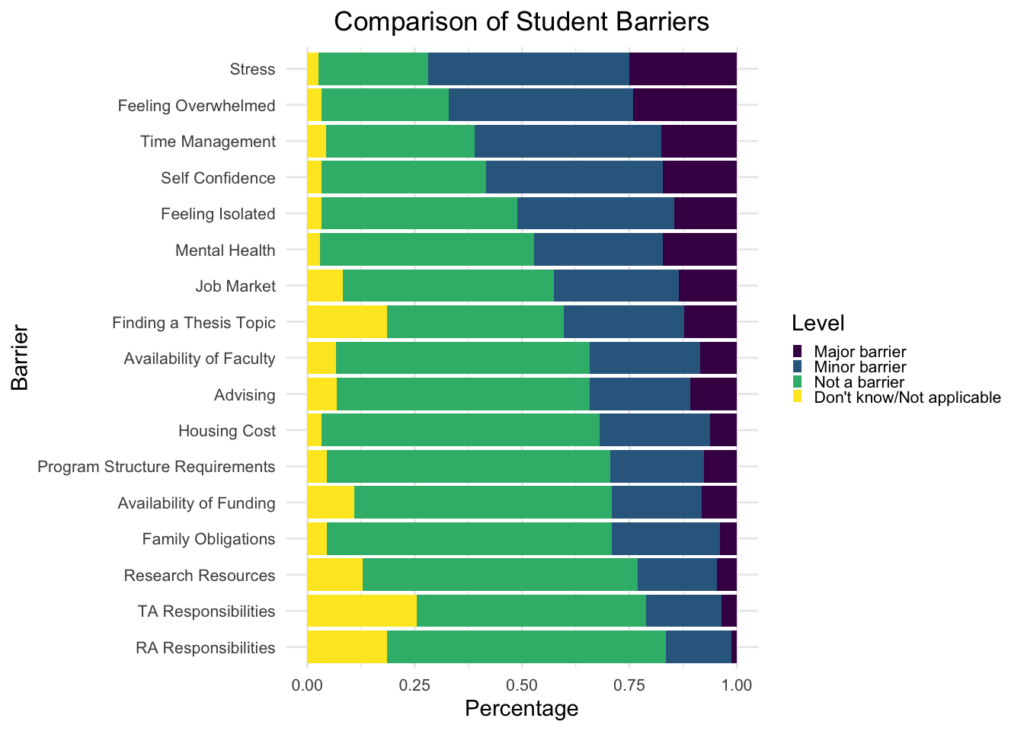
These perceptions paint a nuanced picture. For example, TA responsibilities are often discussed by faculty (e.g., as time taken away from research), but are not as significant to students subjectively, perhaps suggesting that many of the mechanisms in place to help monitor that (e.g., hour limits, GSI contracts, etc.) are effective. By contrast, some topics that may be less-discussed by the faculty as barriers per se (e.g., uncertainty about the job market) are reported by students as impacting their successes.
Department Communication and Transparency
Some questions on the survey focused on access to department resources as well as general understanding of department and program procedures. Many students know where to go for questions about procedures, but they lack access to faculty members for academic/professional development or in case of a faculty conflict.



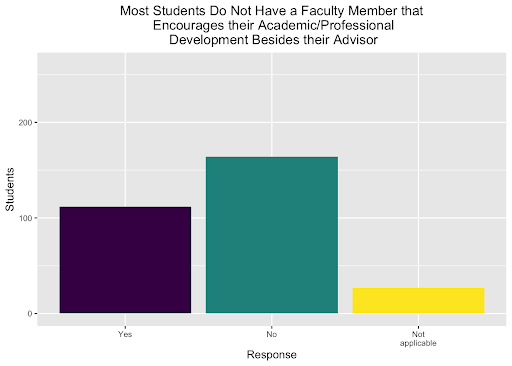
Overall Experience
During the 15-minute check-ins, students were asked about their overall experience, their perception of the quality of support from CSE, their experiences of collaboration, and how they are handling work-life balance. While these situations are not dire, they indicate room for improvement: students are somewhat satisfied with their CSE Experience and Quality of Support and Work-Life Balance encouragement, but not fully satisfied.
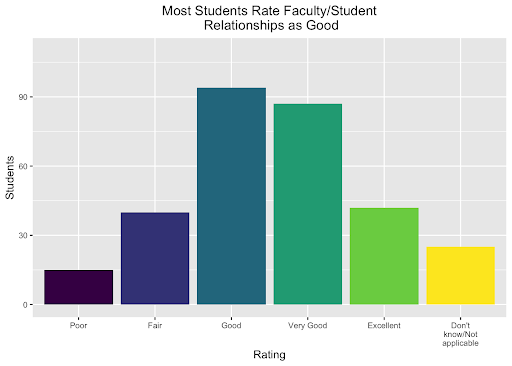
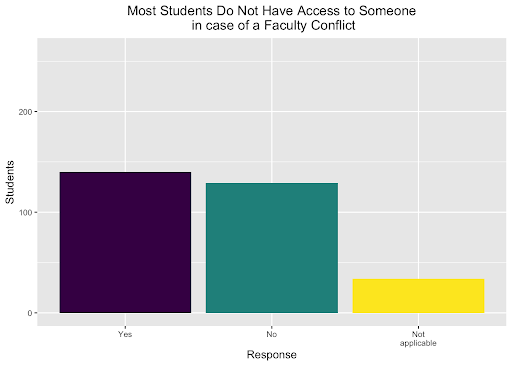
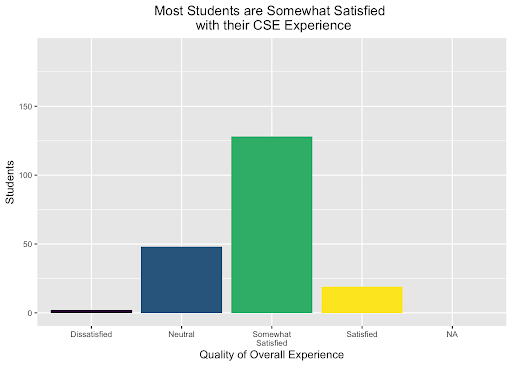
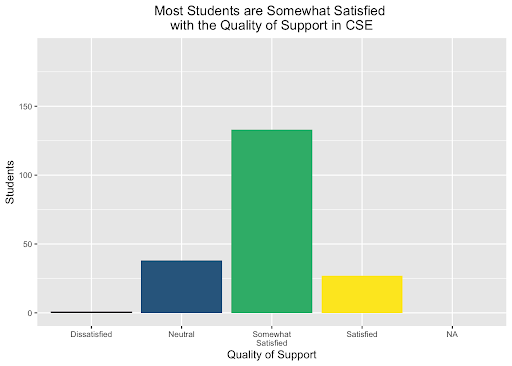
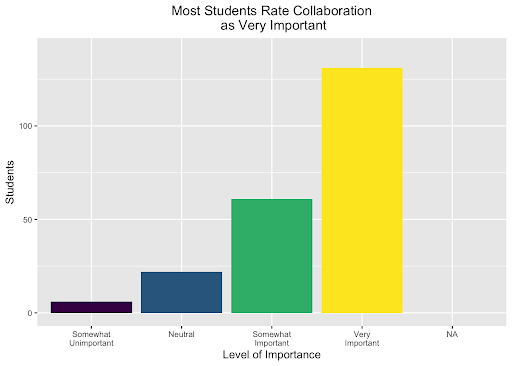
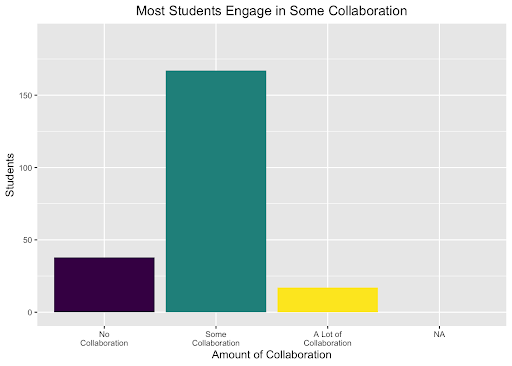
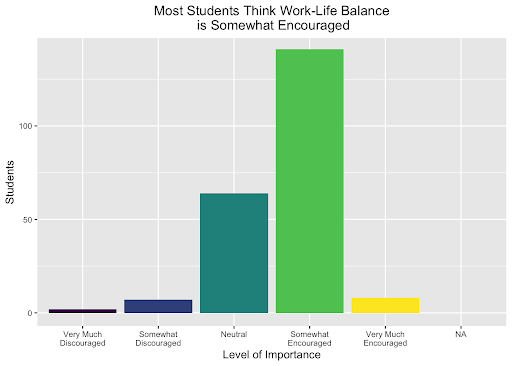
No Per-Laboratory Differences
CSE is broadly organized into five laboratories based on faculty research interests: Artificial Intelligence (AI, 81 students surveyed), Computer Engineering (CE, 54 students surveyed), Interactive Systems (IS, 15 students surveyed), Software Systems (Systems, 69 students surveyed), and Theory (Theory, 7 students surveyed).
There were no statistically-significant differences in quantitative or qualitative data between labs.
For example, the issues that are important to Ph.D. students (Work-life Balance, Sense of Community, Advisor Treatment, Lack of Collaboration, Switching Advisors) are problems within and across all labs.
Similarly, for the qualitative data, students of all labs reported at similar frequencies. For example, the students in each lab mentioned that they did not have enough collaboration (ranging from 10% of the CE Lab to 14% of the Theory Lab, with no statistically-significant difference).
Per-Advisor Differences
While there were no statistically-significant differences between the five labs, there were significant differences between advisors with lower student satisfaction and those with higher student satisfaction.
Correlates With Positive Student Satisfaction
Advisor Communication
- Students with at least one weekly meeting with their advisor and also one weekly meeting with their lab team are happier. In general, students are happiest when asked what they prefer (but this already seems to be the standard experienced by most students). Students who are more satisfied also report that their advisors are fully aware of their current research work and are able to help suggest new directions or troubleshoot when things go poorly.
- One student gives an indicative positive example: “I’m pretty happy with my advisor. She’s available on slack at all times. She’s not super hands-off, she’s aware of what’s going on, weekly meetings are super helpful.”
Collaboration
- It is important to students that they have an opportunity to collaborate. This is especially true for students in smaller research groups. Encouraging collaboration across labs can help with this. Collaboration in this sense is not restricted to working on the same paper, but also includes working together to brainstorm ideas, troubleshoot solutions, etc.
- The majority of the students wished that they had opportunities to collaborate more. The students that have had great experiences in this area were either (1) paired with another graduate student when they first joined the school to work with as their mentor; (2) able to write papers with other labmates because they have similar project interests, or (3) part of a team that meets to chat about their work. At the bare minimum, encouraging graduate students to meet with each other to chat about their work and brainstorm together seems essential.
- One student suggests “I interned at companies over the summer, I realized something we could imitate, we can encourage more discussion among different groups. In the company, they have an open workspace where you can post a concern about something going on, a technical question, anything, and anyone can see it. There are two good things about this – you can get help very quickly, and there are monitors to the workspace, another thing is this encourages collaboration and different discussions among groups. ”
Work-life Balance
- Students benefit from support for work-life balance. Students that were doing better in this area had an advisor who (1) engaged their students in conversations about work-life balance, (2) modeled their own work-life balance (not sending emails at incredibly late hours, taking time off, etc.), (3) actively encouraged their students to take time off, have a life outside of work, or (4) encouraged conversations about life outside of work during work meetings
- One student gives an indicative positive example: “I think my lab has probably the best work-life balance. Our advisor says ‘I’ve got my life you should have yours’. He doesn’t take meetings late. I work 40 hours per week and have never been told to work more.”
- Another student shows how simple actions can have positive effects: “I’m going to brag about my advisor. He sent each grad student a box of goodies from [Restaurant] at the beginning of the summer, a happy summer break, one instance of him being supportive. He is very open to talking about emotional distress. He’s receptive to any emotions, very supportive of that. He has an emotion-first approach. The other thing is he supports the direction that I want to go in.”
Correlates With Negative Student Satisfaction
Micromanagement
- Students report greater levels of stress when advisors place emphasis on the number of hours being worked. Many students spoke of always worrying about whether they were doing “enough”. Some students reported consistently working 60-80 hours per week, and that that was the expectation set for them. There is already a culture of overwork in CSE at multiple levels, so we must emphasize a healthy work-life balance.
Apathetic Communication
- Students benefit from engaged and detailed communication. During weekly advising meetings, students report feeling dissatisfied when advisors (1) meet with them less than once a week, (2) do not respond to emails after several days, (3) only provide high level advice, or (4) are unfamiliar with, or have no connections to help with, their students’ work. Many students who are dissatisfied are either not getting enough communication from their advisors or, when they are communicating, feel that their advisors are not willing or able to give helpful feedback or advice.
Lack Of A Second Supporting Faculty
- Students benefit from knowing multiple supportive faculty members. 60% of students surveyed reported that they do not have a faculty member (besides their advisor) who encourages their academic and professional development. Almost half of the students that surveyed reported that they did not have someone to go to in case of a conflict with a faculty member. We need to build bridges across labs and introduce students to more opportunities to get to know other faculty in CSE.
Individual Advisors
Additional information communicated to the CSE chair identified four advisors with more significant qualitative or quantitative concerns (including perceptions of poor treatment, lack of communication, or funding difficulties) as well as thirteen instances of students switching from nine advisors based on perceived difficulties.
In addition, the report communicated to the CSE chair included six advisors with significant qualitative or quantitative excellence (including perceptions of supporting personal, professional, and academic qualities as well as work-life balance).
This report does not recommend punitive action, and instead suggests that struggling advisors might be given additional support or mentorship on best practices, and that exemplary advisors might be rewarded or recognized, including for promotion and tenure casebook (etc.) considerations.
General Synthesis from the Interviewer
The general summary below comes from the interviewer, Sarah Snay. Snay’s background is in social work, psychology, and qualitative methods. She offers this overall synthesis:
These past few terms have been difficult for all of us. Switching to online learning, not being able to be on campus, learning and working at home – it hasn’t been what any of us have expected. It’s harder to make friends and feel connected, and it’s harder to maintain focus throughout the day. On top of this, the many sexual misconduct cases have been shocking to students. This has all taken a toll. Students are tired, stressed, and overwhelmed. But, they keep going.
Despite the current situation, most students seem to be doing well overall, or at least managing. Most students have had positive experiences at CSE, whether it be interactions with staff members, professors, teaching staff, or fellow students. Students report that mentorship initiatives, the CSEG social hours, and even us reaching out for the 15 minute check-ins have helped.
For Ph.D. students, their experience is largely dominated by their advisor. Students not only rely on their advisor for research direction and guidance, but the advisor and their lab are their main source of support and community. When the lab creates a positive, supporting environment that encourages a healthy work-life balance, students are much more likely to do well. Things become much more difficult with labs that do not have conversations about work-life balance, with faculty who are stretched too thin and prioritize publishing over student wellbeing.
Many Master’s students seem to have the mindset of not making waves – to just study, pass, and graduate. SUGS students, in particular, can sometimes feel undervalued. They perceive a hierarchy within CSE that prioritizes Ph.D. student needs over their own. They’re hesitant to reach out for help. They don’t have the opportunity to get to know professors and they feel restricted by their course options. The community of Master’s students is much smaller, and for some that makes it harder to find their place.
This report focuses on the ways that CSE could better serve its students, so we outline what hasn’t been working for students. This is not to say that all CSE students are unhappy or imply that all students are struggling. Rather, this report is focused on the students who aren’t feeling as supported, so that we may make changes so all can thrive at CSE.
Recommendations
The primary outcome of this Check In activity is the description of graduate student concerns and experiences. However, we also make recommendations for approaching some of the more common issues.
Note that while the DEI Committee may be responsible for assaying student sentiment and concerns, many of the proposed changes fall in the purview of the Graduate Committee or the faculty as a whole. The DEI and Graduate Committees and their leadership are coordinating on overlapping issues.
Work-Life Balance: “Alternate Career Information”. We benefit from separating “essential” from “accidental” difficulty. Many choose to focus on work and faculty careers are known to be time-consuming. In that light, the issue is not work per se but pressure to work beyond what is necessary for career goals. Based on discussions with faculty, a solution like “tell advisors to tell students to take more time off” is unlikely to succeed since many advisors believe that aspects of the job legitimately require significant time. A student who believes it is necessary to have a dozen papers and also be the instructor of record for two classes may struggle with work-life balance. The Faculty Allies Diversity Speaker Series and Women In Computing Series both already showcase alternate career paths and what resume items are associated (e.g., professor at a small liberal arts college, working at the NSF, etc.). We should make it easier for students to hear about career information and requirements and associated work expectations:
- Provide additional funding to encourage students to attend (e.g., free food)
- Provide additional honorarium funding to bring in guests
- Coordinate with courses like Intro to Grad Research (e.g., “you must attend any one of your choosing during the semester for full credit”)
- Have the tenure-track and lecturer search committees formally present to students on how those decisions are made
- Augment the yearly graduate student check-in with questions about considered careers and perceived requirements (to identify mismatches)
No Sense of Community: “Task Force”. CSE has a number of grass-roots efforts (including CSEG, ECSEL+ and faculty-run “social hours” and similar activities). Even before COVID, with recent growth in CSE it is not clear that these approaches were effective. “Zoom Fatigue” and the like are not helping. A radical solution may be required: allocating additional small amounts of funding to existing groups may reach a few more students but is unlikely to make a qualitative change. Many recent activities (from social hours to restorative circles to open office hours to joint events) have been significantly under attended.
- Form a task force or subcommittee to seriously investigate “what is going wrong with current approaches?” and “what do peer institutions do?” and “what would have to be true about community events for participants to not only feel safe but also feel like it is worthwhile to attend?”
- Recognize this as a service activity and that a return to the drawing board is necessary
- Involve student group leadership
Lack of Access to Faculty & Advisor Switching: “Second Advisor”. There has been some faculty-level discussion recently on associating each student with a second, out-of-lab advisor in a structured manner. This would give students another person to talk to about concerns and access to a second opinion about graduate life.
- Enact a structure for second advisors, even if it starts small. As a straw proposal, allow faculty to opt-in to serving as second advisors (coordinated by the Graduate Committee)
- Provided structural rewards, such as having “students for whom I am the second advisor” listed on the Faculty Annual Report as equal in weight to serving on a Ph.D. or Master’s committee, or providing each such faculty-student pair with funding for one sit-down check-in meal each semester
- Strongly encourage or require second advisors to invite their secondary advisees to their group meetings so that students learn about research in other labs and see potential collaborations
Treatment By Advisor (Contact): “Advising Style Questionnaire”. A number of students are in situations where they have very limited contact with advisors (e.g., only near paper deadlines, or only via group meetings) and may not realize that is not the norm. The Graduate Committee Chair is already working on an Advising Style Questionnaire (e.g., in conjunction with the Intro to Graduate Research course).
- Mandate that all faculty complete, and publicly post, that questionnaire
Treatment By Advisor (Verbal Abuse): “Chair Intervention”. Professor behavior perceived as “mean” or “verbally abusive” does not align with CSE values.
- The DEI Committee should provide the CSE Chair with all of the faculty perceived as engaging in such behavior (as mentioned in these interviews) and all of the students who mentioned such concerns
- The CSE Chair should then check in with such students individually, ascertaining what they feel comfortable with in terms of addressing the situation (e.g., to avoid any concerns about potential retaliation)
- The CSE Chair should address such situations as appropriate with individual faculty, and also make a blanket public statement at an appropriate time (e.g., the first faculty meeting of the Fall semester)
Course Requirements: “Normalize Cross-Listing”. Hiring more faculty to teach more courses in different breadth areas is a long-term goal. In the short term, we can place an additional focus on identifying courses that may (e.g., as a result of shifting curricula over time) now qualify as satisfying two areas. In my personal experience, when I looked into having a graduate course satisfy one of two breadth areas for any student taking it, I was met with very significant pushback. A combination of top-down direction and a shared acknowledgment that this is a DEI and student climate issue (and not just a lab or topic issue per se) may allow the faculty to find a way to list more such courses.
- The Graduate Committee should identify the two breadth areas for which the fewest offerings (e.g., by course enrollment) have been available within the last few semesters and find courses that could be said to overlap those areas
Program Structure Communication (SUGS): “Single Person Ownership”. Master’s students in general, and SUGS students in particular, report that the program structure and requirements are not well-communicated, especially compared to CSE Undergraduate Advising. The numbers are small enough that a single person charged with this responsibility could likely “push” communication each semester.
- The CSE Graduate Advising Office and/or the CSE Graduate Committee and/or the CSE Master’s Admissions Committee should designate one person to be responsible for this communication
- This should count as a service assignment or similar duty
- That person should check in with the Undergraduate Advising Office to learn best practices
- That person should push information to each SUGS student at regular times (e.g., application to the program, acceptance to the program, start of semester)
- That person should spot-check and seek out students proactively and assess their understanding
- At the same time, those committees should investigate how information from the Graduate Advising Office is perceived (e.g., even if it is communicated clearly, why do students feel like they are wasting the office’s time when they ask questions)?
Graduate Check-Ins: “Repeat Next Year”. Between identifying immediate at-risk students not already known to CSE to be at-risk, the quality and utility of the data gathered, and the positive mentions of this activity (e.g., being proactive, giving students a voice, creating a feeling of inclusion, etc.), CSE should conclude that the benefits outweigh the costs. CSE should commit to carrying out this activity again next year. However, this first year revealed that the activity is more labor-intensive than initially imagined.
- CSE should allocate funding for staff time to carry out this activity. For example, even if it makes sense for one person to do all of the interviews, it may be that another person could handle scheduling, surveys, and scheduling reminders.
 MENU
MENU